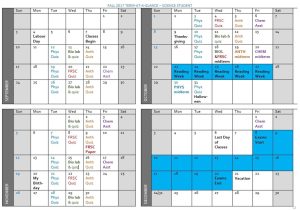Chapter 4: Learning Strategies
33 Term Calendars
A term or monthly calendar is a great way to see your long-term commitments at a glance. You can mark down when big projects are due, important upcoming events, and have a big picture look at your responsibilities. You might benefit from having a physical 4-month calendar somewhere in your study space to visualize your commitments over the course of a semester, which may help to ensure that big deadlines don’t sneak up on you.
Term calendars are good for:
- Keeping track of due dates and how much assignments/exams are worth
- Seeing the big picture of the whole term
- Planning ahead for busier weeks
- Keeping your friends, partner, and/or family informed of your busier weeks and when you may be more distant/closed off/unavailable
- Setting long-term goals, objectives, and projects that you’d like to accomplish over the course of a semester

Strategies For Creating an Effective and Manageable Term Calendar:
1. At the start of each term, read through the syllabus/outline for each course or placement.
- Add class times (including lectures, labs, seminars and placement times) to your weekly schedule and big assignments, tests and exams to your term calendar.
2. Assign a colour to each of your courses/placements.
- Colour-coding your term calendar helps you visualize due dates for each course/placement and helps you track busy periods for each of your classes.
3. Add start dates for projects, not just due dates.
- It’s a lot more effective to do some work every day of the week rather than cramming it in.
4. Highlight busy weeks in your semester so you can physically and mentally prepare yourself.
- This may include both academic and non-academic demands. The nice thing about a term calendar is that it allows you to not only keep track of when school gets busy, but also potential conflicts between school, personal, and social commitments.
5. Surround yourself with people who will support you throughout your busy semester.
- Professors
- Academic advisors/coaches
- Tutors
- Peers and classmates
- Family members and partners
Read “Time Management Strategies for Distance Education” from Simon Fraser University that discusses scheduling and time management strategies for distance education.

